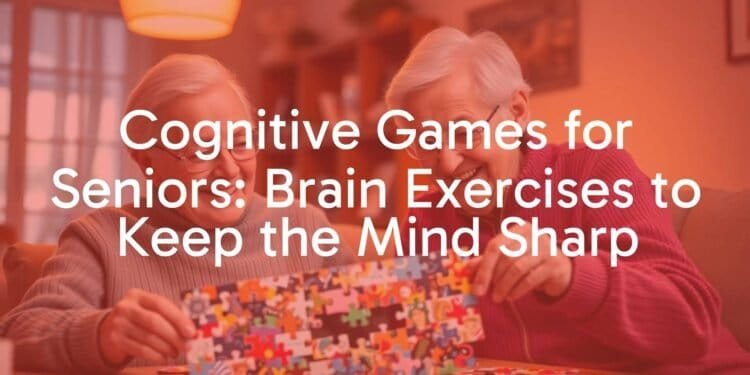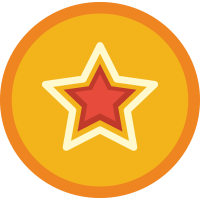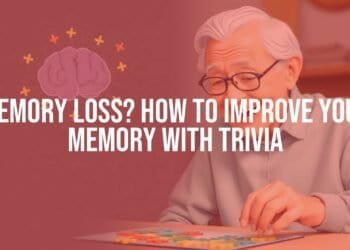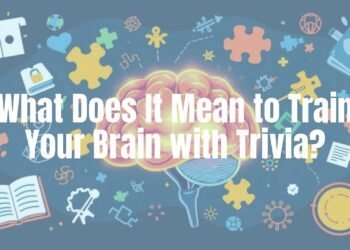Cognitive games for seniors are brain workouts wrapped in fun activities. They help keep the mind active and sharp with age. Like exercise for the body, these games give the brain the practice it needs to stay quick and flexible. Options range from classic board games and puzzles to newer phone and tablet apps. All aim to challenge different mental skills.
With growing awareness of dementia and Alzheimer’s, many people try brain-training games as a proactive step. These games are more than time-fillers. They can build confidence, offer a sense of progress, and create chances for social time at any age. No single game fixes everything, but a mix of activities can support a more active, healthy mind later in life.
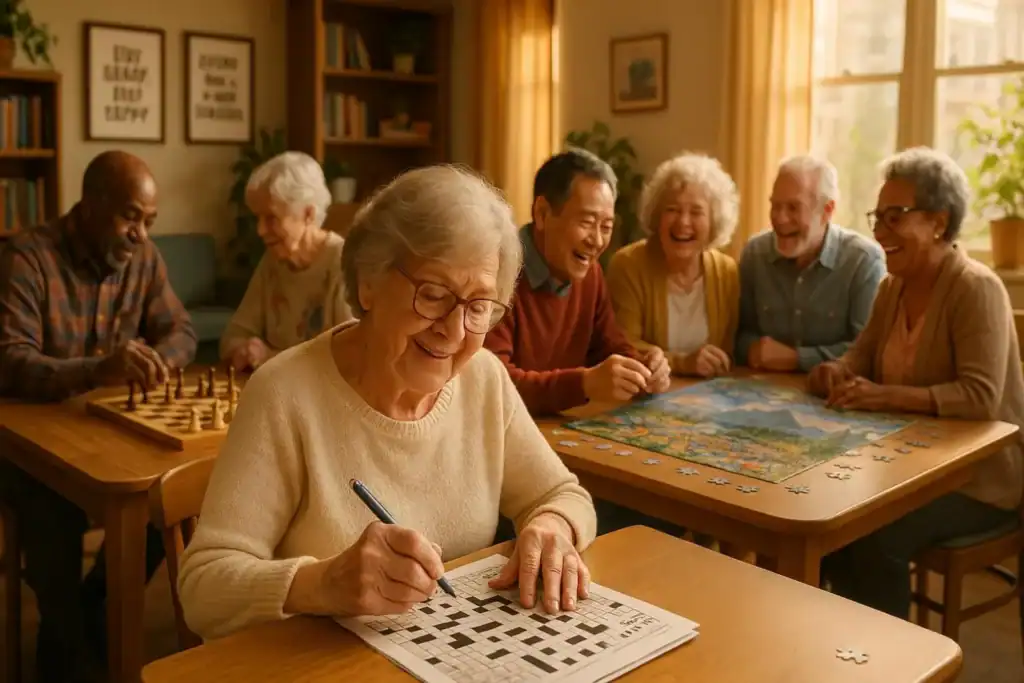
What are cognitive games for seniors?
Cognitive games for seniors are planned activities that ask for mental effort and strategy. They aim to help maintain or improve different parts of thinking. They are purposeful, not just distractions. Think of them as a gym for the mind, where each exercise works a different skill, from memory and logic to language and social interaction.
The brain is not a muscle, but it benefits from steady stimulation. Activities that demand attention and focus challenge the brain and may help delay age-related decline. This category covers both traditional and digital games, so there is something for every taste and ability.
How do cognitive games benefit seniors?
The benefits go beyond simple mental practice. These games play a very important role in supporting memory, reasoning, and processing speed. Studies, including those from the National Institutes of Health, show that regular use can lead to real gains in these areas.
They also help overall well-being. Games can support independence, lower dementia risk, and even help prevent falls by improving focus and coordination. Solving a hard puzzle or learning a new game boosts confidence and mood. Many games are social, which helps reduce loneliness by connecting people with family and friends.
What skills do cognitive games support in older adults?
Cognitive games help seniors keep key skills needed for daily life and independence. They support:
- Memory and recall (short-term and long-term)
- Attention and concentration
- Processing speed
- Problem-solving and decision-making
- Planning and other executive skills
- Language, vocabulary, and verbal fluency
- Social skills and communication
These skills work together to help with everyday tasks and better relationships, while also lowering the chances of isolation.
How do cognitive games help prevent cognitive decline?
Regular mental challenge helps the brain build and strengthen connections, a process called neuroplasticity. This steady workout helps keep the brain flexible and better able to handle the effects of aging.
Research links frequent mental activity with a lower risk of cognitive problems, including dementia. Puzzles, board games, and learning new skills help maintain thinking abilities and may slow decline. The key is active challenge that pushes the brain to adapt and learn over time.
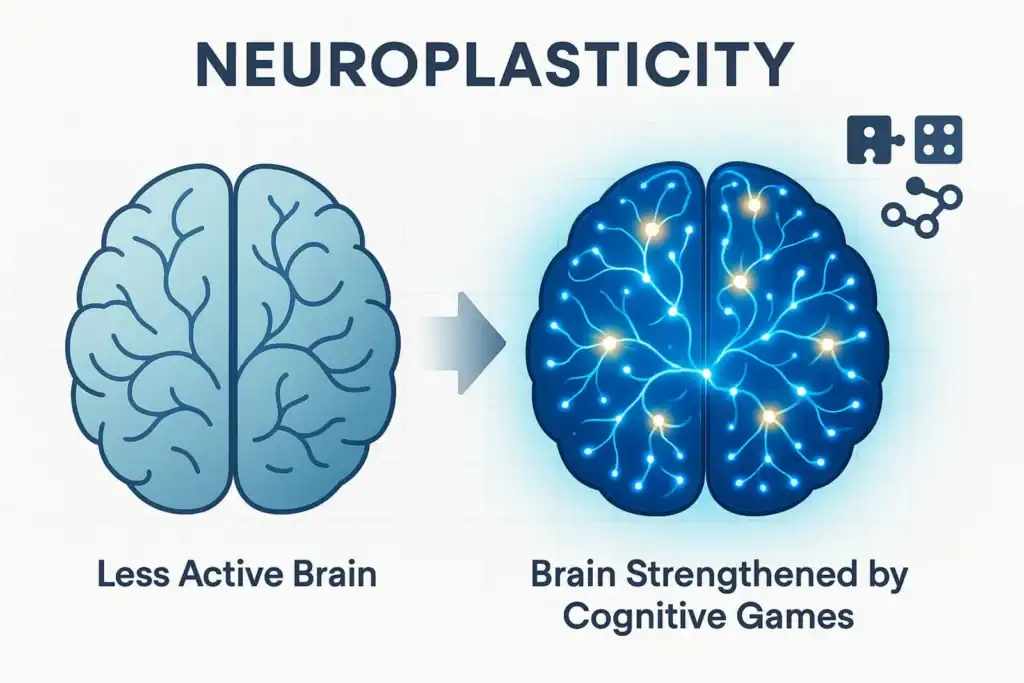
Improves memory and recall
Many games target memory directly. Players may need to remember items on a list, match pairs, or track positions. Memory match, list recall, and crosswords all work short-term and long-term memory. Crosswords ask you to retrieve words and meanings, which strengthens recall.
Searching for the right word or pattern also builds vocabulary and language skills. This steady practice creates stronger memory pathways. It can make it easier to remember names, dates, and appointments, which supports confidence and independence.
Supports attention and concentration
Staying focused is harder with many distractions, and it matters a lot for older adults. Games train the brain to focus on rules, patterns, and multiple details at once. Sudoku needs careful focus to place numbers correctly. Jigsaw puzzles demand close attention to shapes and colors.
With regular practice, people can hold attention longer and screen out distractions. This helps with reading, following talks, and handling bills and schedules. The result is clearer thinking in daily life.
Increases processing speed and flexibility
Processing speed is how fast you take in information, make sense of it, and respond. It often slows with age, but games can help. Timed tasks or games that need quick choices push the brain to work faster. For example, matching images against a clock in “Staying Sharp Double Up™” trains speed.
Mental flexibility is the ability to switch tasks and adapt to new information. Strategy games like chess or complex digital puzzles ask players to reassess, compare options, and change plans. This keeps the brain adaptable and ready for new challenges in day-to-day life.
Encourages social interaction and emotional well-being
Many brain games are great for social time. Bingo at a senior center, cards with friends, or a group jigsaw puzzle creates connection and friendship. Social time helps fight loneliness, which can affect both mental and physical health.
Shared laughs, friendly contests, and teamwork create positive feelings. Finishing a hard game or winning a round can lift mood and support confidence. These activities can also help reduce stress, worry, and low mood, which supports a better quality of life.
What types of cognitive games are suitable for seniors?
There is a wide range of choices for different interests and abilities. The goal is to find activities that are fun and a bit challenging, so people want to keep doing them. From classic pastimes to digital trainers, each type targets different skills.
Seniors can rotate through game types to keep things fresh and work many parts of the brain. This variety helps avoid boredom and supports steady progress.
| Game type | Main skills | Solo/Group | Examples |
|---|---|---|---|
| Memory | Recall, working memory | Both | Concentration, list recall |
| Word & language | Vocabulary, verbal fluency | Both | Crosswords, Word Search, Scrabble |
| Number & logic | Reasoning, problem-solving | Both | Sudoku, Kakuro, number crosswords |
| Visual & spatial | Visual perception, spatial thinking | Both | Jigsaw puzzles, spot-the-difference |
| Strategy & board | Planning, decision-making | Usually group | Chess, checkers, backgammon |
| Digital training | Speed, memory, attention | Both | Lumosity, Elevate |
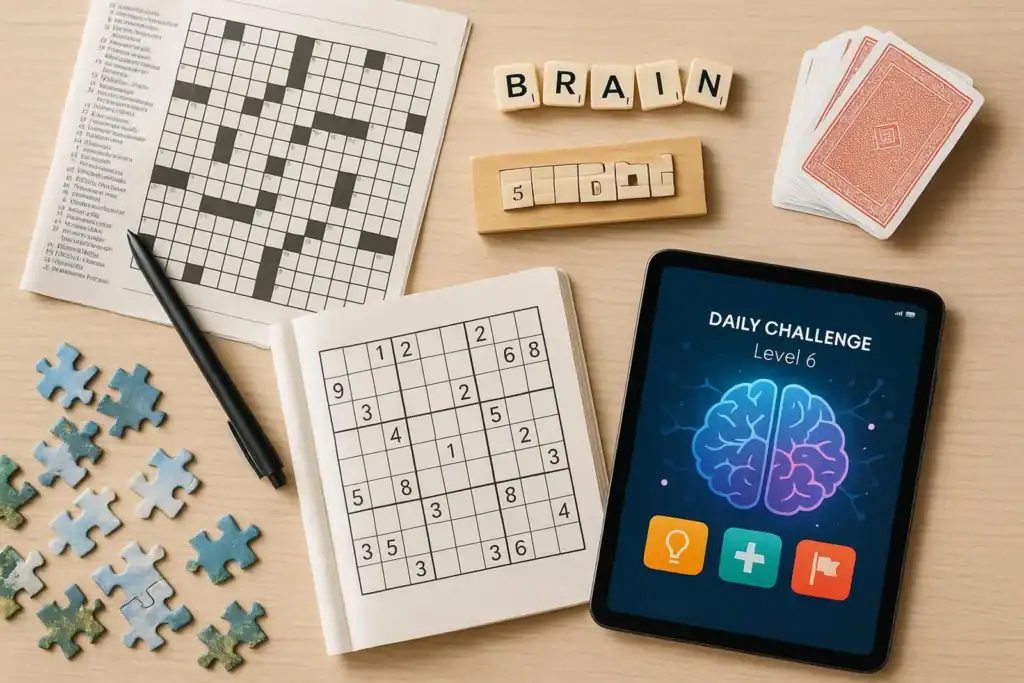
Memory games
Memory games target how we store and retrieve information. They ask players to recall sequences, match pairs, or remember details. Classic “Concentration” has players flip cards to find pairs. “Mem Machines” asks players to remember machine setups. Simple list recall also works well and can be done anywhere.
These games build short-term and working memory, which aids daily tasks like tracking appointments or finding misplaced items. Online versions often add levels that get harder over time to keep the brain engaged.
Word and language games
Word games train language areas of the brain. Crosswords call for recalling words, finding synonyms, and making connections from clues. Regular use may help with focus and delay memory decline.
Word Search builds pattern recognition and speed. Scrabble strengthens vocabulary and strategy. Code Cracker, which maps numbers to letters, blends logic and language. These games help with communication and are fun to play with others.
Number and logic puzzles
If you like analysis and reasoning, number and logic puzzles are a strong choice. Sudoku uses deduction and pattern spotting to fill a 9×9 grid. Regular play can help thinking skills improve over time.
Kakuro blends math with logic. Brain teasers and number riddles challenge calculation and creative problem-solving. Number crosswords mix words and numbers for a fresh spin. These activities train systematic thinking and pattern recognition.
Visual and spatial challenges
Visual and spatial games help with seeing details and moving safely through spaces. Jigsaw puzzles train visual memory and spatial skills while you match shapes and colors. They come in many sizes and can be enjoyed alone or with a group.
Spot-the-difference and picture-matching games train pattern spotting and recognition. Some 3D video games support spatial exploration and can help with everyday wayfinding. Strong visual processing helps with reading, driving, and safe movement.
Strategy and board games
Strategy games build planning, problem-solving, and choices. Chess and checkers train players to think ahead, predict moves, and adapt. Chess is deeper and often demands strong reasoning and focus. Backgammon adds probability and risk management.
Many board games also bring people together. Scrabble or Monopoly can spark conversation and friendly rivalry. This mix of mental work and social time supports both thinking and mood.
Computerized brain training programs
Phone apps and websites now offer many brain-training exercises. Platforms like Lumosity and Elevate provide games you can play on tablets, computers, or phones, which makes practice easy and portable.
Research is still growing, but some studies suggest benefits for people over 60 without cognitive decline, especially for executive function, processing speed, verbal memory, and working memory. For best results, mix different types of digital games. Try to limit screen time near bedtime to protect sleep, and take breaks to reduce eye strain.
What are the best cognitive games for seniors?
The best games are the ones people enjoy and will keep playing. Regular use matters most. There are many solid choices, from long-loved classics to newer options. The games below are popular and helpful for thinking and brain health.
Bingo
Bingo is simple but offers real mental and social benefits. While numbers are called, players scan cards and mark matches. This uses hearing, visual scanning, and quick decisions.
Bingo also brings people together. It encourages conversation and builds community. Calling “Bingo!” adds excitement, and using markers helps hand-eye coordination. It is easy to join and fun for many seniors.
Checkers and chess
Checkers is easy to learn and builds planning and basic strategy. Players think ahead, guess responses, and adjust, which works problem-solving in a clear way. It is a great entry point for strategy games.
Chess is more complex and strongly trains reasoning and focus. Players weigh several moves ahead and compare scenarios. Both games can be played in person or online, offering mental challenge and social time.
Crossword puzzles
Crosswords support language, memory, and focus. They are common in newspapers, books, and apps. Clues push you to recall words and meanings and make connections.
For years, experts have pointed to crosswords as a way to delay memory decline, with one study showing a delay of about 2.5 years. People who do them more often tend to see bigger gains. They also help those with mild cognitive impairment. Crosswords work on paper or on a phone-both count.
Jigsaw puzzles
Jigsaw puzzles are relaxing and mentally rich. Matching pieces by shape, color, and pattern trains visual memory and attention. Many people sort edges or colors first, which builds strategy and problem-solving.
Puzzles come in many styles and difficulty levels, are low-cost, and are easy to find. Working on one with friends or family adds social benefits and a shared sense of progress. Finishing a puzzle feels rewarding and builds confidence.
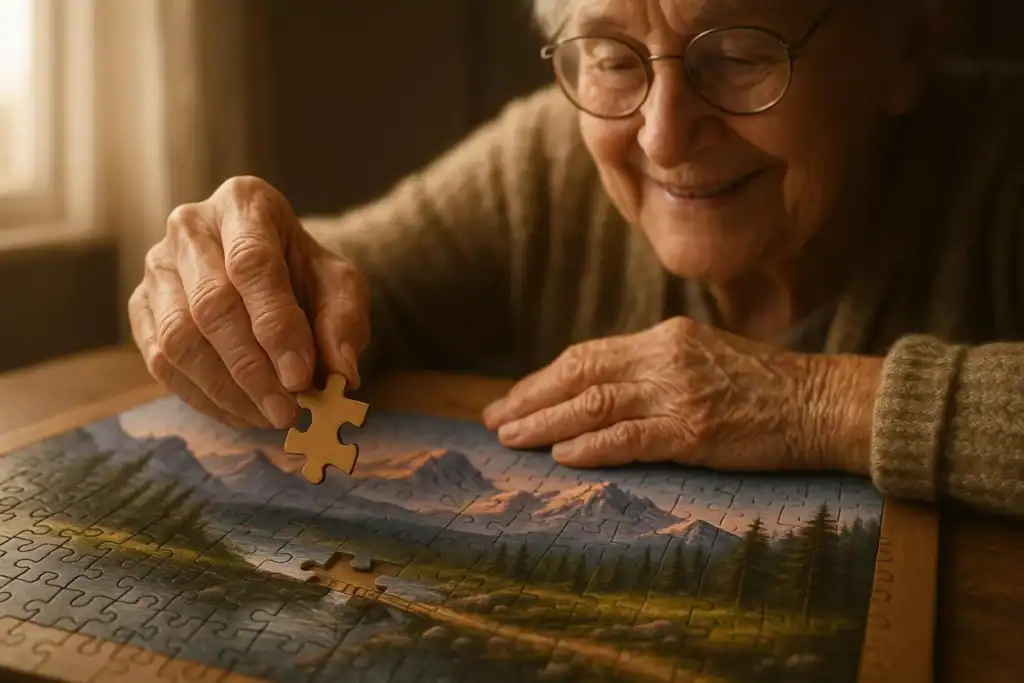
Scrabble or word search
Scrabble challenges players to form words from letter tiles and place them for the best score. It supports vocabulary, memory, and strategy, and it works best with at least two people, making it a great social game.
Word searches build pattern spotting and attention to detail. Players find words hidden in grids across different directions. They can be themed and help with spelling and vocabulary. Both options are available in books and online.
Solitaire and card games
Solitaire and other card games train planning, memory, and concentration. Solitaire asks players to track card order and plan moves, which strengthens focus and sequencing.
Group card games like bridge, gin rummy, go fish, and hearts add teamwork and communication. Bridge, in particular, trains memory of played cards and careful strategy. These games also bring laughter and social bonding, which supports mood and mental health.
Sudoku
Sudoku is a logic puzzle where you fill a 9×9 grid so each row, column, and 3×3 box has the digits 1 through 9. It looks simple but asks for strong reasoning and focus.
Regular Sudoku play improves concentration and memory for number positions and strategies. A study of nearly 20,000 people aged 50+ found that frequent number-puzzle players showed thinking skills similar to people several years younger. Sudoku is easy to find in books, papers, and apps with many difficulty levels.
Trivia quizzes
Trivia quizzes wake up general knowledge and quick recall. Games like Trivial Pursuit or quiz nights cover topics from geography and books to music, TV, and sports. Players access stored facts and decide fast.
Team play adds social fun and active discussion. Getting a question right feels great and builds team spirit. Many senior centers and online groups host regular trivia, making it easy to join and enjoy.
Are digital brain training games effective for seniors?
Phone and web-based brain games are popular and promise sharper thinking. They are convenient, since people can play at home or on the go. Their impact compared with traditional games or lifestyle habits is still being studied, but early findings are encouraging.
Digital games are useful tools, especially when mixed with real-world activities. A balanced view helps: they can help, but they are one piece of a broader plan that includes movement, healthy food, sleep, and social time.
What research says about computerized brain training
Research on digital brain training in seniors is mixed but points to several benefits. Many studies are small and measure different skills, but reviews suggest gains for adults over 60 without cognitive decline.
Areas with the most support include executive function (planning, attention, multitasking), processing speed, verbal memory, and working memory. There is little strong evidence for gains in spatial skills or global attention. We still do not know the best schedule, how long to play, or how long benefits last. Even so, experts often say these games are unlikely to cause harm and may help if you vary the types you play.
When should seniors try online or app-based games?
Online or app-based games are helpful when convenience matters. They run on phones, tablets, or computers and work well for people with mobility limits or those far from friends and family. Many apps also offer multiplayer modes for social play.
They suit seniors who like technology and want a modern pastime. Try to keep screen time earlier in the day to protect sleep, and take eye breaks to prevent strain and headaches. If someone enjoys digital tools and wants an easy way to mix up brain practice, these games are a good addition.
How to choose the right cognitive game for a senior?
There is no single best game for everyone. The right choice fits the person’s interests and abilities. Enjoyment matters because people stick with activities they like.
Look for games that are fun, a bit challenging, and achievable. This approach raises the chance that the person will keep playing as part of a daily or weekly routine.
Consider personal interests and abilities
Pick games that match what the person already enjoys. If they like words, try crosswords, Scrabble, or word searches. If they prefer numbers, Sudoku or Kakuro might suit them. Visual thinkers may enjoy jigsaws or 3D games.
Match the game to current thinking and physical skills. Too hard leads to frustration; too easy brings boredom. Aim for a comfortable challenge. Watch reactions and involve the person in choosing so they feel excited to play.
Adjust game complexity to match skill levels
Difficulty needs to fit the player. If a game is too simple or too hard, people lose interest. Many games offer settings from easy to hard. Sudoku, for example, comes in several levels so players can move up as they improve.
Start easier to build confidence, then raise the challenge slowly. This keeps the brain working at a good level and helps progress without stress.
Accommodate vision, hearing, or mobility needs
Account for vision, hearing, and mobility differences. For low vision, choose large print, high contrast, or games with voice support. Many board games have large-print versions, and apps often let you increase font size. Larger boards and pieces help those with arthritis.
For hearing loss, pick games with clear visuals instead of sound cues. Quiet rooms help with group play. If mobility is limited, use tablet or computer games or board games that need little movement. The goal is easy access so the person can focus on thinking, not on physical barriers.
What are the practical tips for incorporating cognitive games into daily life?
Adding brain games to a routine can be simple. Small, steady steps work best. Think about how to make games a natural part of the day so they feel enjoyable, not like a burden.
Mix scheduling, social time, and both digital and traditional formats. This approach supports steady practice and better well-being.
Setting a regular routine
Consistency matters. Like exercise, the brain benefits from regular practice. You do not need hours each day. Short sessions work well, such as 15-30 minutes on a crossword in the morning, a board game in the afternoon, or brief app sessions spread out through the day.
Tie game time to daily habits, such as after breakfast or before dinner. Keep it a regular appointment so the brain gets steady practice.
Combining games with social activities
Pair mental games with social time for a strong effect. Many games are social by nature: Bingo, bridge, gin rummy, Scrabble, and chess all work well in groups.
Plan game nights, join clubs, attend trivia events, or build puzzles with family. Shared fun makes it easier to keep going and adds support for mood and connection.
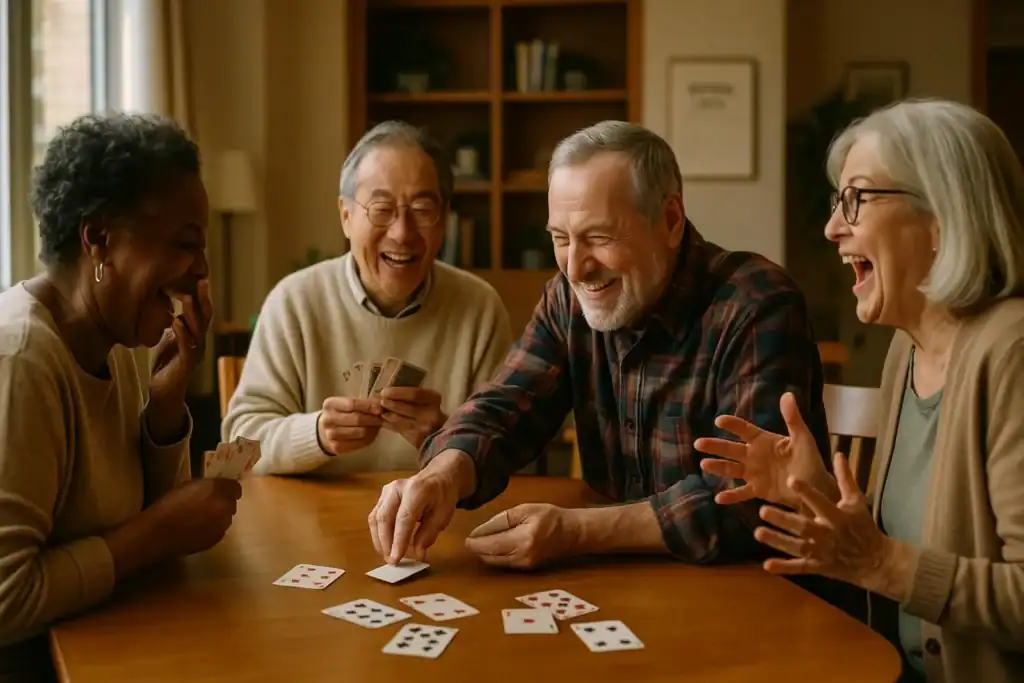
Balancing screen-based vs. traditional games
Use both digital and traditional games for a full mix. Apps are convenient and often adjust to your level. They are great for quick practice and variety.
Traditional games add hands-on play and face-to-face time, without screen side effects like eye strain. A sample day could include a short app session, a crossword with coffee, and a board game with friends later on. Mixing formats keeps training broad and effective.
Frequently asked questions about cognitive games for seniors
People often have questions about how to use brain games, what results to expect, and how to fit them into daily life. The answers below offer clear guidance to help seniors and caregivers make good choices.
Should seniors play cognitive games daily?
Daily play is helpful, but the main goal is regular practice. Think of it like steady exercise. Short, frequent sessions work better than rare, long ones. Aim for daily or near-daily time to keep the brain active and flexible.
Sessions can be brief-15-30 minutes can help. Rotate different types of games to work many skills and keep it fun. Pay attention to energy and enjoyment so the habit lasts.
Can cognitive games slow dementia progression?
This is a complex topic, and research is ongoing. No single game is a cure, but steady mental activity, including brain games, is linked to lower risk and may slow decline in conditions like Alzheimer’s.
Reading, board games, puzzles, learning new skills, and social time all support brain health and may slow changes over time. Brain games help build and strengthen pathways in the brain. They work best as part of a broader plan that also includes movement, healthy eating, good sleep, and social contact.
What are signs a game is too difficult?
Watch for signs that the game is beyond the player’s comfort level. Warning signs include not making progress, confusion about rules even after help, and rising frustration or irritability.
Other signs include avoiding the game, losing interest, or showing stress (sighs, frowns, restlessness). If this happens, switch to an easier game, lower the difficulty, or break tasks into smaller steps. The aim is engagement and a sense of success, not stress.

